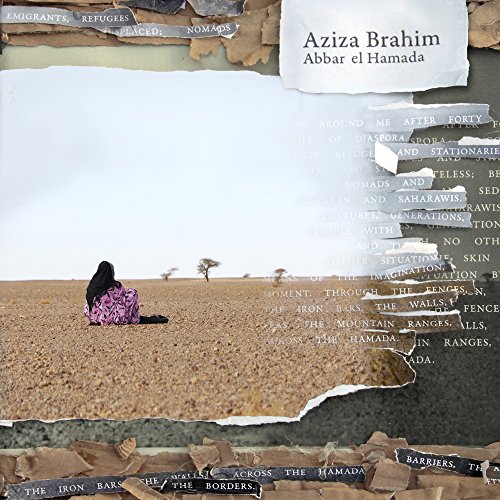
Aziza Brahim
Abbar El Hamada
Release Date: Mar 4, 2016
Genre(s): International
Record label: Glitterbeat
Music Critic Score
How the Music Critic Score works
Buy Abbar El Hamada from Amazon
Album Review: Abbar El Hamada by Aziza Brahim
Fairly Good, Based on 6 Critics
Based on rating 4
The Western Sahara, a sliver of land rather bigger than the UK located on north Africa’s Atlantic coast, has a tragic history. Formerly a Spanish colony, it has been occupied by Morocco since the 1970s despite a strong pro-independence movement among the territory’s indigenous Saharawi population. Over 100,000 refugees from the resulting conflict still live in camps across the border in Algeria.
Based on rating 3/5
Raised in a refugee camp in Algeria, Aziza Brahim embodies and mourns the displacement of North Africa’s Sahrawi people. Her ascent has been steady rather than spectacular, her breakthrough coming with 2014’s Soutak, an elegant acoustic set that drew from her adopted Barcelona home. Here, Brahim embraces the electric desert blues popularised by Tinariwen and Tamikrest (with whom she shares producer Chris Eckman).
Based on rating 3/5
The Sahrawi refugee camps in Algeria are a bleak reminder of the plight of those displaced from what they have called “occupied western Sahara” since the Moroccan invasion in 1975. Aziza Brahim was born in the camps before moving on to Cuba and Spain, and her 2013 album Soutak, a deserved bestseller in Europe, matched powerful songs of Sahrawi defiance with laments for the refugees. She returns to the same issues here, but sounds unexpectedly laid-back.
Based on rating 3/5
Born and raised in a refugee camp in the Algerian desert but living in exile for the last two decades, vocalist Aziza Brahim has often used her platform as a musician to tackle themes of oppression and nationhood. While her chief lyrical concern has been fighting the Saharawi cause (her parents’ birthplace in the Western Sahara remains disputed territory), previous album Soutak also paid tribute to more global issues, such as the recent insurgency in Mali. Musically, her work reflects a similarly broad scope, with previous long-players combining western rock with Tuareg and Malian influences.
Opinion: Excellent
Like generations of Sahawari people, Aziza Brahim grew up in refugee camps after her pregnant mother fled the Moroccan occupation of the Western Sahara in 1976. As far back as the late 1990s the conflict in the region was being described as a "forgotten" war, and with political resolution seemingly no closer, and little to no coverage in the press, Brahim's music expresses the social injustices felt by many Sahawari people. Brahim was born in a refugee camp near Tindouf, in Algeria.
Opinion: Fairly Good
Aziza Brahim had it rough when she was young. Born in a Saharawi refugee camp in the Algerian desert, she’s lived in exile from her home for two decades, currently residing in Barcelona. The singer/songwriter hasn’t let that poison her outlook, however. Her latest album Abbar el Hamada fronts defiance of oppression everywhere, but comes equally loaded with optimism and hope.
'Abbar El Hamada'
is available now

